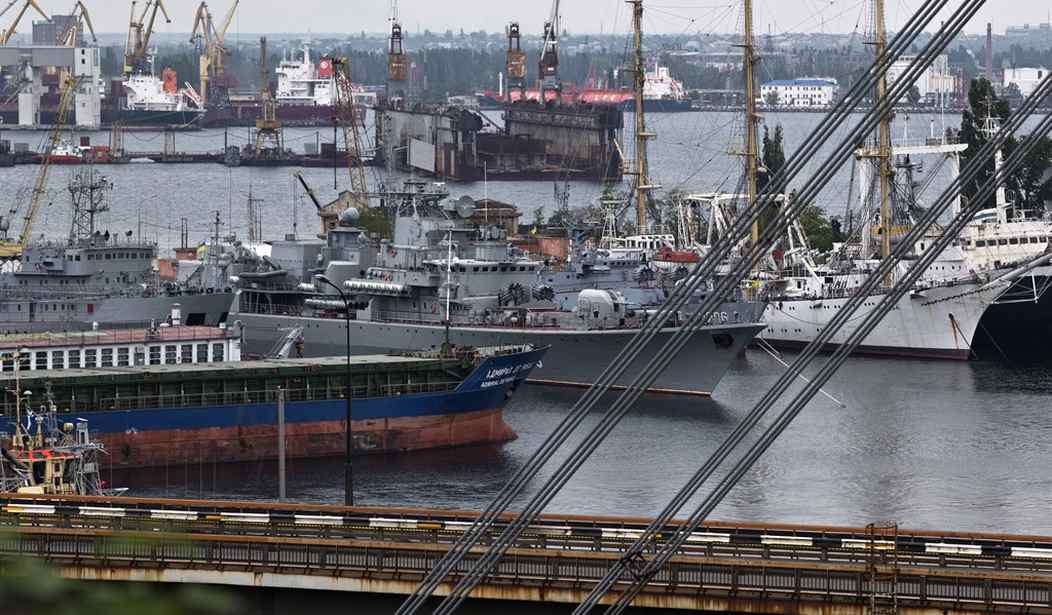Top News
Right after ending grain deal, Russia attacks Odesa

Shortly after Russia pulled out of the Ukraine grain shipment deal, some of us were counting the hours before the Russians would attack Odesa (or Odessa, if you prefer), Ukraine’s primary port for cargo vessels. We didn’t have long to wait. This morning, Russia launched a volley of military drones at the port city, followed by a half dozen Kalibr cruise missiles. But Ukraine’s military resilience has clearly improved since the beginning of the war, particularly in terms of the air defense capabilities installed by the United States. All of the drones and cruise missiles were shot down before reaching their targets. Unfortunately, the falling wreckage of the weapons still caused some property damage and injured one person, but the operation of the port was not disrupted. (AP)
Ukrainian forces shot down scores of exploding drones and six cruise missiles from a pre-dawn Russian attack on the port of Odesa on Tuesday, Ukrainian authorities said, a day after Moscow broke off a deal that had allowed Kyiv to ship vital grain supplies from the Black Sea city during the war.
The Russians first sought to wear down Ukraine’s air defenses with the drones and then targeted Odesa with six Kalibr cruise missiles, the Ukrainian military’s Southern Command said.
All six missiles and 25 drones were shot down by air defenses in the Odesa region and other areas in the south but their debris and shock waves damaged some port facilities and a few residential buildings, injuring an elderly man at his home, officials said.
Assuming any of the war zone press releases can be believed, it wasn’t a good day for drone and missile strikes for either side. Shortly after the news about Odesa was released, the Russians claimed that the Ukrainians had launched another strike on Crimea using 28 drones. They said that 17 of them had been shot down and the rest were “disrupted” via electronic warfare defenses and crashed. None reached their targets.
The Ukrainians are having a lot more success on the air defense front since American Patriot missile systems began arriving this spring. It’s taken some time to train the Ukrainian operators and get all of the systems installed, but they are now clearing the skies on a regular basis. Ukraine has also installed powerful floodlights around commonly targeted areas to help them identify and destroy some of the slower, low-tech drones from Iran that the Russians are using.
Russia is continuing to insist that it will restart the grain deal once “restrictions” are lifted on its own food and fertilizer exports. But there have been no sanctions placed on Russian grain exports. The situation is a bit complicated because some of the banks and investors who finance grain exports have been sanctioned, but there reportedly hasn’t been much of an impact on the actual shipments. The EU did briefly impose some “curbs” on Russian fertilizer exports last year, but those restrictions were lifted in December. So it still appears as if Russia is basing its complaint leading to the end of the Ukrainian grain deal on something that isn’t actually happening.
The effects of the end of the grain export deal were felt almost immediately. Prices for wheat and other grains all rose across the region.
Russia’s withdrawal from a critically important wartime deal that allowed the export of Ukrainian grain across the Black Sea has reignited fears about global food security. Wheat, corn and soybean prices all rose on the news.
The organization that oversaw agricultural exports under the Black Sea Grain Initiative said China was the top country to receive foodstuffs.
I wanted to highlight that report primarily because of the statistic about China. It turns out that China was the largest importer of Ukrainian grain products. They accounted for roughly one-quarter of all grain exports. If the collapse of the grain export deal starts impacting China directly and leads to any level of food insecurity, Russia may come under pressure from its largest ally to back off and allow the deal to resume. It would be a roundabout way of ending this standoff, but it would be better than nothing.
Read the full article here


















